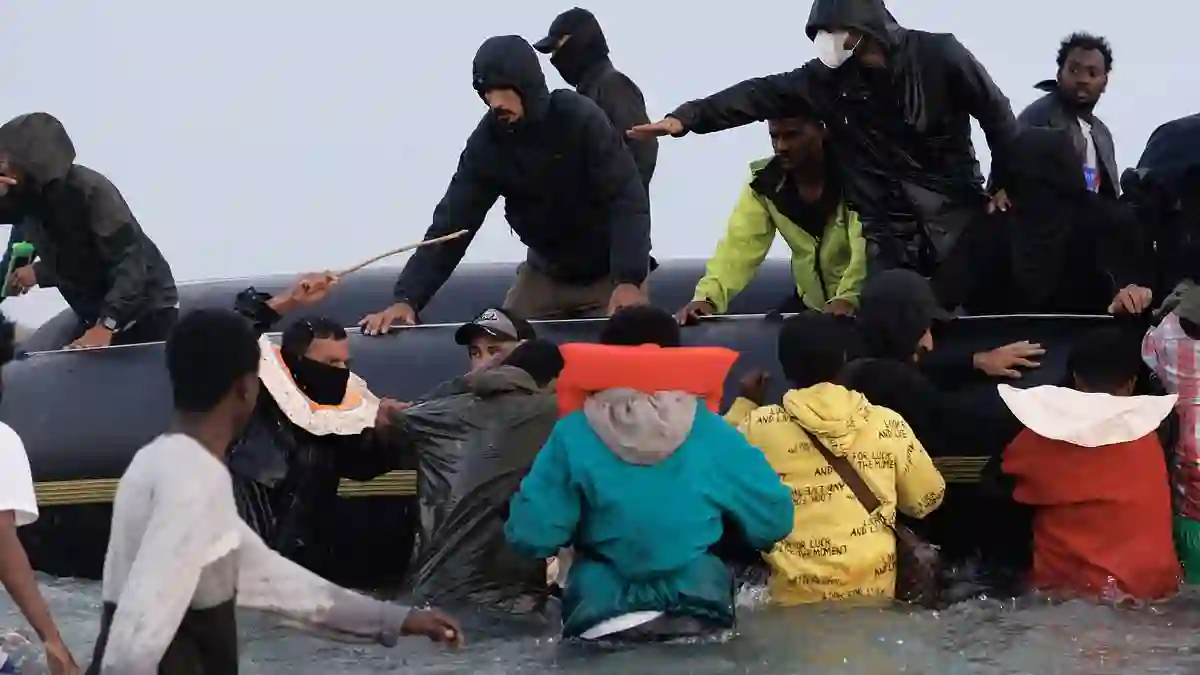Before dawn broke on the northern coast of France, the usually quiet Gravelines beach near Calais was transformed into a chaotic scene of desperate migrants scrambling to board small boats bound for England.
It was a striking display of how the migrant crisis continues to intensify despite the presence of French police nearby.
Migrants Rush Into the Water as Dinghies Approach the Shore
Arriving on the scene at 5:30 a.m., reporters witnessed groups of mostly young men rushing down a long stretch of beach, wading knee-deep into the chilly waters.
From a nearby canal, a dinghy filled with passengers emerged and headed back to shore, ready to pick up more migrants.
Surprisingly, the French police officers on duty waited at the water’s edge but did not intervene directly.
Their orders were clear: avoid contact with migrants or boats in the water to prevent accidents or injuries.
People Smugglers Use Whips to Control Boarding on Overcrowded Boats
As the rubber dinghy approached, migrants climbed aboard freely.
However, to avoid the boat tipping over, a smuggler’s assistant in the water used a cane to whip migrants who tried to board too quickly, a harsh tactic to control the crowd.
This unsettling episode highlights ongoing challenges for UK border security.
Since the start of this year, more than 20,000 migrants have crossed the Channel, marking a 48% increase compared to the same period last year.
This surge follows political changes, including the scrapping of a controversial asylum deal with Rwanda.
Police Seem More Interested in Press Than Migrants
While the police officers stood by with dry feet, their interaction focused not on the migrants but rather on the press present.
They questioned the reporter and photographer, demanding IDs and even taking their photos.
When asked why migrants were left alone, one officer suspiciously asked if the journalists had advance information about the crossings.
In fact, Gravelines has long been known as a hotspot for “taxi-boat” smuggling, where small boats launch from inland waterways and quickly ferry migrants across the Channel for a hefty fee.
Migrants Continue to Board Despite Increasing Police Presence
After the first dinghy headed out to sea only to turn back, a second group of around 30 migrants was spotted nearby.
Again, the migrants boarded easily, and this time the boat set off for England.
Some officers expressed concern over the presence of children in the group, while others joked about the inevitable arrival in the UK.
By 6 a.m., the dinghy was disappearing into the horizon, trailed by a police motorboat and a distant French naval ship.
The police admitted they only learned about the boat’s movement once it was already out in the water.
New Groups Keep Arriving Despite Fog and Rough Conditions
Just as mist rolled in and conditions worsened with ferry horns echoing in the distance, a fresh group of migrants appeared from the dunes, some wearing bright lifejackets and clearly prepared for another crossing attempt.
They moved in organized groups into the water, boarding a second dinghy near a nuclear power station.
A man in a green hoodie coordinated the boarding, ensuring people settled carefully to keep the boat balanced.
Vulnerable Migrants Struggle to Get Aboard as Boats Reach Capacity
The dinghy appeared full but then turned back, heading toward another group waiting further along the beach.
Among these migrants was a visibly distressed African mother carrying a baby, who was helped onto the boat amid tears and struggles.
Families, elderly men, and children tried to board, some with only flimsy toy floatation devices for safety.
Many, like a young Afghan man, were turned away for lacking proper lifejackets and expressed their determination to try again despite the risks.
A Continuing Crisis with No Easy Solution
These heartbreaking scenes at Gravelines illustrate the human toll and the complexity of managing illegal crossings.
With smugglers adapting quickly and official forces hesitant to engage directly in the water, the cycle of desperate journeys continues unabated — and so does the pressure on both French and British authorities.
